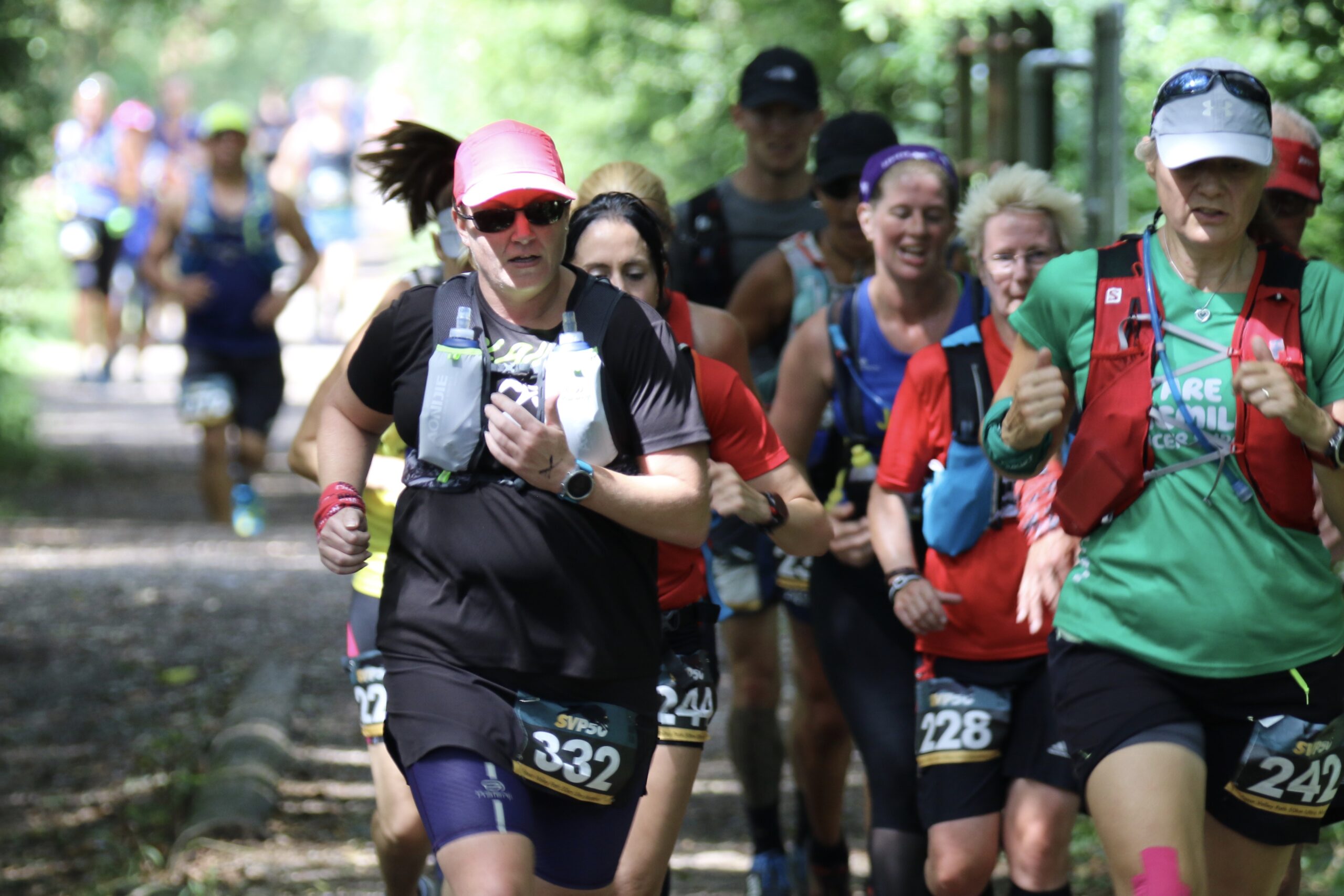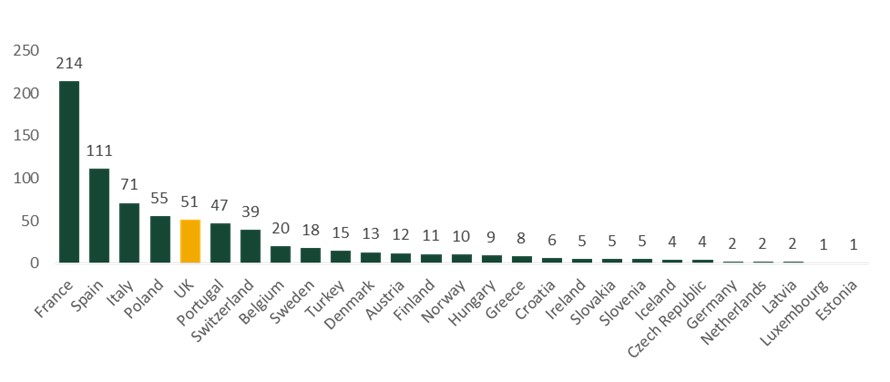The best trail ultra marathons for beginners in the UK
- – There is a higher proportion of slower ultra runners in the UK compared to Europe
- – Ultra running is more inclusive in the UK with many races suitable for beginners; time limits are more generous than in Europe
- – There is a higher proportion of female ultra runners in the UK compared to most European countries
- – Top 10 races for beginners can be seen in the tables towards the end of the article
As a keen ultra runner and race director who reads various running forums, I commonly see the question “What is the best ultra marathon for a beginner?” Responses are always qualitative and subjective, so I decided it was time to take a quantitative approach to find a more definitive answer. With the help of the International Trail Running Association (ITRA) and DUV Ultra Marathon Statistics (DUV), I have crunched the numbers and found some fascinating insights concerning the most suitable ultra marathons in the UK for beginners, in addition to the UK running culture compared to our European neighbours.
Back in 2013, I set up a race called the Stour Valley Path 100km which has attracted a considerable number of runners over the last eight years. The cut-off for the race was set at 15.5 hours so that runners would need to average a pace of just over 4 miles per hour to finish. However, it quickly became clear that some runners believed this cut-off was too challenging. They wanted to experience the race and run the route but were concerned about the time limit. As the race director, I also had volunteers, the staff at the Brantham Leisure Centre and local residents to consider, so decided that extending the cut-off was not the best option. Instead, I introduced a 50km race on the same day starting from the half-way point, with a generous cut-off of 9.5 hours. I figured this would be a good compromise for the many runners who wanted to experience running in an ultra-race along the Stour Valley Path but without the strict time pressures. Needless to say the 50km race proved to be popular and sells out every year.

There are clearly a number of runners in the UK who wish to participate in ultra marathons but may be concerned about jumping in at the deep end or entering races which have tight cut-off times. It made me wonder how many other ultra marathons in the UK are suitable for beginners, as it can be tricky for someone to find this information if they are unfamiliar with the sport. I figure this is why people frequently ask for advice about beginner-friendly ultra races on the forums.
Before diving into my analysis and findings I thought it would be useful to provide a bit of background about ultra running in the UK. The sport has grown at an annual rate of 27% between 2009 and 2019, based upon DUV participant numbers. There are now close to 40,000 runners from the UK listed on the ITRA website. ITRA are the governing body for trail running and it is fair to say that the majority of ultra races are held on trails rather than roads. ITRA collect race results for events and currently have a database of 1.7 million runner results and more than 6,330 races globally.
ITRA assign a performance index (PI) to each runner who has completed a race listed on its website. The PI allows for the comparison of the speed of trail runners around the world, with scores ranging from 0 to 1,000. International-level females typically score over 700 whilst males score over 825. ITRA consider both male and female runners with a PI less than 350 as ‘Novice’. It is interesting to note the distribution of PI scores in Europe compared to the UK shown in Chart 1. The UK appears to have a much larger proportion of ‘Novice’ runners, with 28% of performances falling into this category versus only 13% in Europe.

Chart 1 – Distribution of ITRA Performance Index scores. Source ITRA
Why do we have a greater proportion of slower runners in the UK? Is ultra running perhaps a more inclusive activity with lower barriers to participation, or are there a larger number of ‘easier’ races with more generous cut-off times?
The UK has a greater proportion of slower runners than Europe
The RunRepeat website provides global marathon statistics to the end of 2018. The average Swiss runner completed the distance in just over 3 hours 50 minutes, whilst the average UK runner took just over 4 hours 30 minutes, probably weighed down by a rhino suit or a camel costume. I’ve run the London marathon dressed as the back-end of a camel and can confirm that it definitely hinders progress. Running to raise money for charity is a large part of our culture in the UK as evidenced by the many races with a specific focus on good causes. I have not seen such a prominent focus elsewhere in European races.
There are no European countries in the marathon statistics list that have a lower average finisher time than the UK and this is mirrored in the ITRA data. It is safe to assume that a certain proportion of these slower marathon runners from the UK are also taking part in ultra marathons.
Ultra running is a much more inclusive sport in the UK compared to Europe
This is a difficult to prove conclusively but looking at the female to male ratio is a useful starting point. The DUV website shows the proportion of female to male ultra runners by country. Compared to European countries, the UK had the third highest proportion of female ultra runners based upon 2019 race results for approximately 30,000 people. This can be clearly seen in Chart 2, where the UK had a female to male ratio of 32:68, just behind Iceland and Finland. In fact, we also see a similar picture when looking at RunRepeat marathon statistics, where the UK was ranked 4th globally with a female to male ratio of 33:67.

Chart 2 – The percentage of male and female ultra runners in 2019. Source DUV
Beyond the female to male ratio, the fact that the UK has more novice runners certainly further promotes inclusivity. Novice runners are more likely to encourage other novices to participate and many UK ultra races can be finished by walking due to generous time limits. In some European countries the sport is not so open to all abilities due to stricter time limits. This pattern can clearly be seen mirrored in the big city marathons for example, where London allows 7 hours to finish, compared to 5 hours 40 in Paris, 6 hours in Amsterdam and 6 hours 15 in Berlin. This may partly help explain why the average marathon pace of UK runners is slower as more people are able to finish races before being timed out.
The dreaded DNF (Did Not Finish) can also be highly demotivating and it is likely that some runners may not choose to participate in further races after failing to finish or are unlikely to recommend a race that they have not finished.
Beyond the traditional running clubs there are also many friendly running collectives which started in the UK, such as Advent Running, Run Dem Crew and Midnight Runners. These communities aim to keep people motivated and often the members encourage one another to enter events en masse and will be frequently seen at various ultra marathons around the UK.
The UK has a larger number of ‘easier’ races with generous time limits
Are there a larger proportion of races suitable for novices in the UK? To determine this, ‘2 ITRA point’ races have been analysed. Essentially, ‘2 ITRA point’ races typically have 45-74 ‘Effort Points’, where 1km distance is equal to 1 effort point and +100m ascent is equal to 1 effort point. Any race with less than 2 ITRA points is not likely to be considered an ultra marathon by many, which by definition is a footrace longer than 42.195 km (26 miles 385 yards). Any race with more than 2 ITRA points will require significantly greater effort and therefore may not be an entirely suitable recommendation for a novice.
Chart 3 shows that in 2019 there were 51 races in the UK which were categorised with 2 ITRA points, which could potentially be suitable for a novice. In fact, the UK had the fifth largest overall number of 2 ITRA point races and many of these races have very generous time limits compared to equivalent races in Europe.

Chart 3 – The number of 2 ITRA point races held in 2019. Source ITRA
Of the 51 races in the UK carrying 2 ITRA points, which would be considered the most suitable for novices? ITRA categorise each race with a ‘Finisher Index’, based on distance, elevation, cut-off time, plus other information about the course. ITRA also assign ‘Mountain Points’ to each race based on longest continual climb, average altitude and total ascent to distance ratio. The ‘Finisher Index’ and ‘Mountain Points’ are designed to help a runner determine their capacity to finish a particular race before signing up. Therefore, in theory the lower the ‘Finisher Index’ and ‘Mountain Points’, the greater the chance a novice runner could complete a race within the time limit.
There are also other factors that can determine the difficulty of a race such as the overall number of participants, course markings, weather conditions and the nature of the trail. If there are more people running in a race it can help with both navigation and motivation. In some smaller events it might be easy for a novice runner with limited navigation experience to get lost even on a well-marked course or become demotivated because they have not seen another runner for hours on end. The time of year for the race is also important, as winter races can often be much harder due to low temperatures, muddy conditions underfoot and less daylight hours.
The best ultra races for beginners
Based upon these factors and using the ITRA data, some of the most suitable trail-based ultra marathons in the UK for novice runners can be seen highlighted in Table 1. The easiest race is potentially the Dulux London Revolution Trails, which is 52km long with 450m ascent and a generous 13 hour cut-off. Other popular races for beginners based upon number of finishers are the Run to the Sea Bournemouth and the Stour Valley Path 50k.

Table 1 – 10 most suitable ‘novice’ ultra races based upon ITRA data
Some UK-based ultra races are not registered with the ITRA so I also looked at the DUV dataset to analyse a larger sample. In addition, I spent many hours during the lockdown trawling through race websites to find information on elevation gain and cut-off times where this information may not have been supplied to DUV. In the case of races that do not have a specified cut-off time, I have used the time of the slowest finisher and then rounded up to the closest half hour to obtain an approximate cut-off. As you can see from Table 2 there is considerable overlap between the top 10 from both the ITRA and DUV datasets, alongside a few additional names for consideration.

Table 2 – 10 most suitable ‘novice’ ultra races based upon DUV data
*No specified cut-off. Approximate time of last finisher is shown in the table. ˣ2021 race has been cancelled
Neil Thubron, Race Director for the two Humanity Direct races listed in table 2, says that he “wanted to open up the wonderful friendly world of Ultra Running to a whole new group of runners”, hence creating a series of races that are designed to take away some of the fears that people might have of long distance events. He removed cut-off times to make the events less stressful and to attract both walkers and runners, in addition to providing regular well-stocked aid stations, a tonne of course markings and plenty of celebrations throughout the whole event. There is clearly a charitable element to his races too.
Tom Sutton from the Serpent Trail Race also notes that his race is set at 50km as this is one of the “shortest milestone distances for an ultra marathon” and is along a route that is both flat and non-technical in nature, with plenty of aid stations. Additionally, the “cut off of 14 hours is specifically set so that it is inclusive and relaxed for people doing their first ultra or for walkers too”.

Finally, it is worth noting that there are other popular races not included in this analysis which may be suitable for beginners. For example, timed events such as 6-hour races may be a suitable entry point to ultra running, as you essentially run on a circuit with many other participants and only have to worry about the clock and the strength of your legs. Backyard ultras, where runners must consecutively run the distance of 6,706 metres in less than one hour, may also be a very suitable entry point worth considering.
Now is truly a great time for UK-based runners to consider entering their first ultra marathon. Not only do we have a friendly and inclusive running culture in the UK, but we also have plenty of races that have been designed with first-time ultra runners in mind, with generous cut-offs and plenty of support. On top of that, as restrictions are eased across the UK, trail-based ultra marathons are likely to be some of the first races to be allowed to go ahead. What more motivation do you need to dust off those trail shoes and get signed up?
